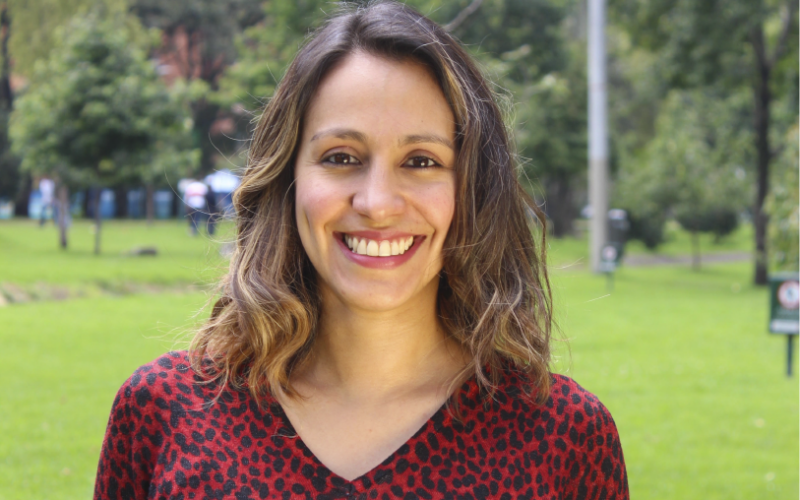LatAm List – Juliana Villalba Torres has over 10 years of experience as an entrepreneur and has co-founded two successful companies in Latin America: CreativeLab and Rebus Technology. She studied to be an engineer at the Pontificia Universidad Javierana in Bogota and then specialized in Innovation and Business Development at the Universidad Externado de Colombia. As CEO of Rebus Tech, she provides event organizers with tech solutions that help maximize their event revenue.
Rebus Tech was chosen to take part in Apps.co and Seedstars’ International Expansion Program which took place last November in Mexico. We had the opportunity to do a Q&A with Juliana to hear about her experience and insights on being a female entrepreneur in Latin America and what awaits Rebus Tech in 2020.
Q: What does your company do?
A: At Rebus Tech, we help event organizers increase their income through upselling. From the moment customers buy their ticket to the days after the event, we offer them products and services that will make their overall experience much more memorable. The experiences can vary from enjoying champagne in a limousine to meeting their favorite athlete in the locker room during a sports event. We use AI to recommend services and products based on each person’s profile.
Q: Why did you decide to start Rebus Tech and focus on the events industry?
A: In my first startup, I would help companies create disruptive experiences and innovation strategies. I started receiving calls from companies that would organize corporate events and that’s where I started to learn about the dynamics involved in organizing an event. The biggest limitation was always the budget so we started brainstorming ways in which we could generate greater revenue. With my partner’s background in tech and my experience in events, we started developing a tech solution. We saw how other industries like hotels and airlines were creating additional income by upselling and tried to find a way in which we could bring that to the events industry.
Q: How did your family and friends react to your decision to start a company?
A: Today, when you say that you’re going to start a company people get excited. However, that wasn’t the case 10 years ago when I decided to become an entrepreneur, especially in Colombia. If you were going to start a company, it was because you came from a traditionally entrepreneurial family.
I decided to become an entrepreneur due to life circumstances. I had just broken up with a boyfriend and was happily unemployed. I took that time to learn about myself and started getting together with my first partner. My parents would push me to get a job since they always thought I was playing around. When people would ask them, “What does Juliana do?”, they would respond, “Well, she’s doing some stuff, but soon she’ll start looking for a job.” Until I opened an office and started hiring employees, they didn’t understand how my company was working.
Obviously now, 10 years later, they’re extremely proud to say “my daughter, the entrepreneur… she doesn’t have one, but two companies”, but it took a lot of convincing for them to realize that this wasn’t a game for me.
Q: What are the main differences between raising money in Latin America and the US?
A: There are many. In Latin America, you need to create a relationship of trust with your investors before they even consider investing. This aspect makes the process a lot longer. Trust is not something that can be built in less than three months, even if you are as intense as I am. I write my investors a lot of emails, we do video calls, and if they come to Colombia we meet up and I also try to visit them as well. In the US, it’s a lot easier for someone to invest in you after having met once or even if they just like your idea.
Latin American investors are also very risk-averse. They prefer to invest in ideas that have already been validated. Our company is a model that works very well in other industries, but in ours, it’s a new concept. There needs to be a change in that mindset, otherwise, it’s going to be increasingly harder to have more unicorns or disruptive companies in Latin America. We’ll become followers of trends rather than trendsetting companies.
Q: Can you speak to specific challenges or benefits of being a female entrepreneur in Latin America?
A: I’ve always viewed it as an advantage. It’s what makes us stand out, and we’re almost always the only ones. I’ll go to meetings with investors and I’m the only woman. In a room of ten male entrepreneurs, investors may ask “Which was that company?”, but they’ll always remember the woman’s company.
In Rebus, we’re a team of three founders. Two men and me. I think investors gain a sense of security knowing that there’s a woman in the team, somebody to keep everyone grounded. In general, men tend to exaggerate everything. It’s a world where the “fake it till you make it” mentality prevails and investors love that. However, they also want a dose of reality. I’m in charge of the numbers and managing our relationship with our investors. I think women are almost always the most reasonable in a company, while men tend to be the dreamers.
I’ve had meetings where questions tend to be directed to my male partners. That was quite common in the US. I think in Latin American culture, men are used to women that are more vocal about their opinions. In the US, the questions would always be directed to José, my partner, even though I would be the one to answer. It was as if they needed the validation of a man for my words to be true.
Q: What can the ecosystem do to help empower women to found more companies?
A: As women, we need to escape our own limitations of not starting a company because we think it means not fulfilling other life objectives like being a mother. Having a company does bring a lot of instability, but we need to educate women on the idea that one does not exclude the other. I know many successful women entrepreneurs that are mothers and the main providers of their household.
At an ecosystem level, having a female founder should be old news. In Colombia, there’s an all-women investment fund, founded by women, and created to support women entrepreneurs. Investment funds should have at least one woman in their founding team, or if possible, be evenly distributed.
Q: What advice would you give other female entrepreneurs looking to start a business?
A: I think we find it hard to believe in our own story. When you start a business, you have an idea, and you have to believe that the idea is going to work. If you don’t, no one will. For women, it’s harder because we want all the facts that say it will work before taking the leap.
We have to take a risk and lose that fear of failure. We have to learn to be practical like men. Men screw up one day and by the next, they’ve moved on. It’s like Ariana Grande says, “Thank u, next’. Sometimes it’s good to be less emotional and reflexive, especially in situations where you have to constantly be on the move and pivot your idea. Don’t get attached to your ideas. Learn to be resilient, otherwise, you’ll go crazy. That’s why I think mixed teams help a lot in that aspect because men can get out of that a lot quicker.
Third, have a voice. During Q&A sessions at conferences, it’s very rare to see a woman raise their hand. It’s always men that do so. And usually, when women raise their hands, the questions tend to be a lot smarter. Women need to learn to speak up, even in their own company. They need to believe that their opinion matters and that they shouldn’t stay quiet.
Q: What’s next for you and Rebus?
A: Rebus is expanding into new markets. We already have clients in Mexico where we are opening offices, I will be leading that expansion in Mexico, so there will definitely be a change of country this year for me. I love change. I think it’s part of the essence of any entrepreneur. We’re also in the process of approaching the US market. We started with a familiar market (Colombia), then moved on to a familiar but different market (Mexico), and afterward, we plan on going to a completely new market (US).
We also expect to open a new investment round this year, keep growing our team, and finetuning our product in terms of AI, machine learning, and data analytics. We’re excited to start this year with interesting growth projections, and we closed 2019 with new international clients which we’re really excited about.



